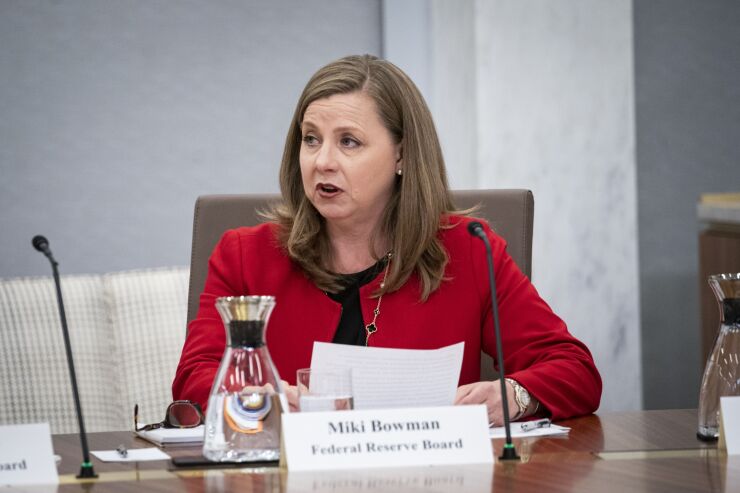
The Federal Reserve Board of Governors approved the expansion of Texas bank despite concerns raised about potentially discriminatory practices at the company.
The board unanimously approved Vantage Bank of Texas's application to open a branch in Houston, putting aside public comments about the bank's track record for
"I support the approval of this application," Gov. Michelle Bowman said in a written statement that accompanied the decision's announcement on Tuesday. "However, I believe that the Board should improve its approach to processing applications in cases where a member of the public has made an adverse comment, particularly when the recent supervisory record addresses the concerns raised and is consistent with approval."
Bowman's comment is a rare example of a Fed official voicing their personal opinion about a board action. Typically, the organization prioritizes consensus in its decision-making.
Vantage, which has $3.5 billion of consolidated assets and operates 22 branches in Texas, had applied for a new branch under section 9 of the Federal Reserve Act and the Fed's Regulation H. That process includes opening the application up to public comment.
Two commenters raised issues with the bank's lending practices, according to the Fed. One said Vantage failed to provide small business and consumer loans to Black borrowers and businesses with less than $1 million of revenue in and around Dallas and Fort Worth. The commenter also said the bank did not loan money in census tracts with high minority or high poverty populations. The second commenter accused the bank of discriminatory marketing and lending practices against Black individuals and neighborhoods.
The San Antonio-based bank refuted these claims, pointing to the results of its last two Community Reinvestment Act, or CRA, examinations, which assess a bank's efforts to meet the needs of underserved communities around its branches. Vantage said there was "no evidence of discriminatory or other illegal credit practices inconsistent with helping to meet community needs was identified." It also noted that 21 of its 22 branches are in minority-majority census tracts, and the proposed Houston location would be as well.
The Fed found that the Vantage had received "satisfactory" marks from the Federal Reserve Bank of Dallas for its CRA exam last year, with "low satisfactory" ratings on each of the three main testing categories: lending, investment and service. The reserve bank also determined that most of the bank's activities were concentrated within its assessment areas and that it had a good mix of borrowers and businesses based on income and revenue, respectively.
The challenge comes as the Fed and other federal regulators are
Along with its pre-existing efforts, the bank also promised to use its new location to expand its service of low- and moderate-income individuals and communities. These commitments, along with Vantage's record of adhering to fair lending and consumer protection rules contributed to the Fed's conditional approval.
"The Board's approval is specifically conditioned on compliance by Vantage Bank with all the conditions imposed in this order, including receipt of all required regulatory approvals, and on any commitments made to the Board in connection with this proposal," the board wrote. "For purposes of this action, the conditions and commitments are deemed to be conditions imposed in writing by the Board in connection with its findings and decision herein and, as such, may be enforced in proceedings under applicable law."






